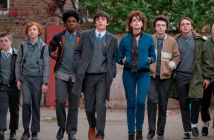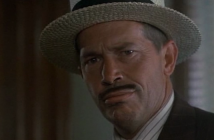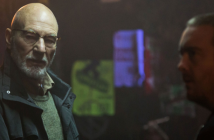
Blue Ruin (2013)
Cast: Macon Blair, Devin Ratray, Amy Hargreaves
Director: Jeremy Saulnier
Country: USA
Genre: Thriller
Official Trailer: Here
Editor’s Note: Blue Ruin is out in limited release this Friday, April 25th.
“That’s how this is done,” sneers the criminal who’s just regained control of a situation via a shotgun somewhere around the midpoint of Blue Ruin. He’s speaking to the film’s inept hero, who’s trapped him in a trunk as part of the increasingly messy revenge narrative that drives the plot, but given the cleverly-twisted tropes of the genre here it’s as much to the movie itself he talks. Recapitulating the cliché that has come to attend stories of this sort, Jeremy Saulnier’s sophomore feature is a superbly-scripted affair, melding vengeance with veracity to give a thriller that’s efficient for how far from taut it is. “That” may be how this is done in the movies; Blue Ruin is one that returns reality to the equation.
Recapitulating the cliché that has come to attend stories of this sort, Jeremy Saulnier’s sophomore feature is a superbly-scripted affair, melding vengeance with veracity to give a thriller that’s efficient for how far from taut it is.
 Its clearest predecessor, as few have failed to point out, is the Coens, whose films—Blood Simple and No Country for Old Men especially—bear the same focus on the lingering impact of violence and vengeance. How “this” is done should never be as clean as much of Hollywood would have it; Saulnier, like the brothers before him, places appropriate emphasis on blood stains and bruises, on the messy reality of murdering a person. Blue Ruin may never grant us the grisly sight of a wood chipper feasting on human remains, but its up-close angles on a knife to the head is every bit as aggrieving, its scenes of self-surgery just as likely to send pupils darting to the floor.
Its clearest predecessor, as few have failed to point out, is the Coens, whose films—Blood Simple and No Country for Old Men especially—bear the same focus on the lingering impact of violence and vengeance. How “this” is done should never be as clean as much of Hollywood would have it; Saulnier, like the brothers before him, places appropriate emphasis on blood stains and bruises, on the messy reality of murdering a person. Blue Ruin may never grant us the grisly sight of a wood chipper feasting on human remains, but its up-close angles on a knife to the head is every bit as aggrieving, its scenes of self-surgery just as likely to send pupils darting to the floor.
Just as concurrent with the brothers Coen is Saulnier’s slick sense of jet-black humour, exploiting Macon Blair’s endearing everyman performance to the magnificently macabre end of sanguine slapstick and aggressive absurdism. It can’t be coincidence that Blair’s beach bum protagonist steals an attire that looks borrowed from Woody Allen’s wardrobe before setting off to reap his revenge: his neurotic fish out of water in a world of crime makes for a movie that plays a little like Bananas by way of Blood Simple. If it seems curt to consider the film in terms other than its own, it shouldn’t: Blue Ruin is a movie forged on the foundations of forebears, as much dependant on their legacy as it is deferent toward it.
ust as concurrent with the brothers Coen is Saulnier’s slick sense of jet-black humour, exploiting Macon Blair’s endearing everyman performance to the magnificently macabre end of sanguine slapstick and aggressive absurdism.
 Outside of its gestures toward genre heritage, Saulnier’s story says less than it seems set on, despite its silences. The determined absence of dialogue for large swathes of the film—superbly shouldered by Blair’s array of facial tics, if laboured a little when left too long—is paramount to its streamlined structure, which focuses firmly on actions and reactions, and the incitement to both. It’s a film about family, at the frankest level, a sentiment suggested early in an intensely subtle scene before being pressed all too firmly in the final reel. The last moments are troubled in a way otherwise alien to the movie; where a character leaving a house at the start of the film sets the ball rolling, the same action at the end does so only for the eyes.
Outside of its gestures toward genre heritage, Saulnier’s story says less than it seems set on, despite its silences. The determined absence of dialogue for large swathes of the film—superbly shouldered by Blair’s array of facial tics, if laboured a little when left too long—is paramount to its streamlined structure, which focuses firmly on actions and reactions, and the incitement to both. It’s a film about family, at the frankest level, a sentiment suggested early in an intensely subtle scene before being pressed all too firmly in the final reel. The last moments are troubled in a way otherwise alien to the movie; where a character leaving a house at the start of the film sets the ball rolling, the same action at the end does so only for the eyes.
An undercurrent of insight into the ease of access to weapons in America is enough to warrant some wonder at Blue Ruin’s workings, but if it’s intentional at all it’s far from the movie’s chief concern. That, simply put, is playing with preconceptions to make a film that’s fantastically fun for its unerring ability to surprise. Buoyed by crisp lensing by Saulnier himself, channelling interiors and evening alike to an aesthetic twist on thematic darkness, Blue Ruin never aims for more nor less than to be a terrific time at the movies. And that it is: much as its Coen comparisons might render it akin to a greatest hits album compiled by a record company with restricted rights access, it’s easy to understand why it’s been so openly embraced.
Blue Ruin never aims for more nor less than to be a terrific time at the movies.




Pingback: http://freecelebritywallpapers.com/profile/luisewart4()
Pingback: guitar picks()
Pingback: banheiras()
Pingback: yspro.ne.jp()
Pingback: best deals online webstore()
Pingback: porno()
Pingback: can t lose weight()
Pingback: Pablo Tartsah()
Pingback: Best buy smartphone accessories()
Pingback: Leaflet()
Pingback: medora centre()
Pingback: plumbing repair Cherry Creek()
Pingback: movie2k()
Pingback: roofing()
Pingback: roofing()
Pingback: puppy playpen()
Pingback: online contest()
Pingback: ramalan zodiak()
Pingback: t shirt league of legends()
Pingback: iPhone reparation Göteborg()
Pingback: Brand Bangla Eshop()
Pingback: Employment law firm()
Pingback: licensed master plumber()
Pingback: 100% CASINO WELCOME BONUS()
Pingback: Custom Clothing()
Pingback: FCPX()
Pingback: elderly transportation services()
Pingback: Stop Foreclosure Schertz Texas()
Pingback: Visit This Link()
Pingback: Professional 3m auto window tint austin()
Pingback: master plumbers Austin TX()
Pingback: free instagram followers app()
Pingback: dp my wife()
Pingback: literature review writing service()
Pingback: est restaurant manchester()
Pingback: digital signage canada()
Pingback: 49cc()
Pingback: wedding ring denver()
Pingback: this one()
Pingback: digital signage media players()
Pingback: window tint austin()
Pingback: sacred 3 trainer()
Pingback: poker()
Pingback: history of name()
Pingback: this website()
Pingback: plumbing pipe repair austin()
Pingback: early stage of diabetes symptoms()
Pingback: donald trump()
Pingback: mental health()
Pingback: Parkinsons()
Pingback: created for the health conscious()
Pingback: Robert Domanko()
Pingback: Read More Here()
Pingback: Drinking water filter Barrie Ontario()
Pingback: internet marketing experts minneapolis()
Pingback: stlpiky()
Pingback: tenerife blog()
Pingback: movietube()
Pingback: why not find out more()
Pingback: cat transport()
Pingback: Mp3 Urbano()
Pingback: hungry shark mod apk()
Pingback: boom beach apk hack()
Pingback: Simple Drawing For Kids()
Pingback: cooking class singapore()
Pingback: antispam e.v.()
Pingback: logo design sydney()
Pingback: banner printing()
Pingback: 5 gallon glass water bottle dispenser()
Pingback: Emergency drain clearing tarrytown()
Pingback: vr()
Pingback: malaga agencia de publicidad()
Pingback: security camera()
Pingback: Magan()
Pingback: overnight pet care naples()
Pingback: carpet cleaning()
Pingback: Saian Skin Care()
Pingback: mobile phone monitoring()
Pingback: need more info()
Pingback: hpi text check()
Pingback: man cave store()
Pingback: Buy Isagenix Online()
Pingback: Erect on Demand()
Pingback: retaining walls()
Pingback: internal cleansing system()
Pingback: Banheira()
Pingback: movietube()
Pingback: Back pain Minneapolis()
Pingback: acid reflux cure()
Pingback: flat belly overnight program()
Pingback: Approach Your Actions()
Pingback: catch caddy for car()
Pingback: Penny Auction Software()
Pingback: anastasiadate()
Pingback: Vehicle GPS Tracker()
Pingback: you won't believe()
Pingback: make money online fast()
Pingback: buy spy camera pen()
Pingback: make money blogging()
Pingback: edm mix()
Pingback: Instantly ageless ingredients()
Pingback: film production studio()
Pingback: Vietnam travel guide()
Pingback: liquor stores near me()
Pingback: health fitness()
Pingback: ESTELLE()
Pingback: drugs()
Pingback: get traffic()
Pingback: natural weight loss method()
Pingback: seo singapore()
Pingback: Computer Services Gainesville FL()
Pingback: Bulk whatsapp Malaysia()
Pingback: bulk whatsapp gateway()
Pingback: diabetes()
Pingback: Braintree()
Pingback: how to get business credit without using personal credit()
Pingback: real estate brokerage tampa bay()
Pingback: hammacher schlemmer nose hair trimmer()
Pingback: bathroom scale jokes()
Pingback: tv antenna youtube()
Pingback: real estate brokerage tampa bay()
Pingback: How to fix a relationship()
Pingback: leather charging station organizer()
Pingback: serviporno()
Pingback: hcg injections()
Pingback: Cash 4 Clothes()
Pingback: bad parking()
Pingback: jump manual pdf()
Pingback: punta cana dominicana()
Pingback: Tour de France()
Pingback: How to get him back()
Pingback: Henleys doors()
Pingback: tenerife property()
Pingback: gap insurance cost()
Pingback: landscaper Canberra()
Pingback: Dianabol Tablets()
Pingback: d?i lý son dulux()
Pingback: legal highs Europe()
Pingback: http://www.facebook.com/CleaningQuotes()
Pingback: Google Algorithm()
Pingback: casino malaysia()
Pingback: Thai Porn()
Pingback: http://rosengard.tv()
Pingback: Crawler Dozers For Sale()
Pingback: overnight cat sitter in naples()
Pingback: fly swatter target()
Pingback: loren weisman()
Pingback: Cooling()
Pingback: organizer caddy xl()
Pingback: solar related()
Pingback: Columbia()
Pingback: Call now to get the All Inclusive Package On Sale Now!!()
Pingback: fotos de bucetas()
Pingback: free messenger()
Pingback: Google penguin updates()
Pingback: streaming series gratuit()
Pingback: Latest Tech Updates()
Pingback: Dian Clute()
Pingback: workout()
Pingback: Compatible Cartridge Brother TN-221 TN-225 Cyan()
Pingback: affärsjurister i stockholm()
Pingback: c c++ java courses in pune()
Pingback: Run A Webinar Review()
Pingback: www.howrsehack.pl()
Pingback: Restorative dentistry cedar park()
Pingback: Secure Hard drive destruction()
Pingback: Computer Repair Fort Lauderdale()
Pingback: Fiber i Oslo()
Pingback: tarifas m�s seguras()
Pingback: leather()
Pingback: https://www.facebook.com/sexiercom/()
Pingback: solar related()
Pingback: toenail fungal infection()
Pingback: Buy Isagenix()
Pingback: dance party lights()
Pingback: Isagenix Retail()
Pingback: gaming()
Pingback: rent an apartment()
Pingback: Damage Factory()
Pingback: SuperGaminator Bonus()
Pingback: Learn to sing and play guitar()
Pingback: best scalping ea()
Pingback: porno()
Pingback: 22 Minute Hard Corps Download()
Pingback: home safes()
Pingback: teleteria casino reviews()
Pingback: Expert comptable boulangerie()
Pingback: Manhattan Home Design Reviews()
Pingback: cara mendaftar sbobet()
Pingback: spa break jersey()
Pingback: music streaming()
Pingback: See inside()
Pingback: seo services()
Pingback: SILVER SPRING apartment cleaning service()
Pingback: personal trainer()
Pingback: Startups In Delhi()
Pingback: Billig tannlege()
Pingback: k rend()
Pingback: Titwala properties()
Pingback: lubes and lotions()
Pingback: Goggles()
Pingback: how to get ex back letter()
Pingback: Tom Petty()
Pingback: porno()
Pingback: Cabo limousine service()
Pingback: gold ira()
Pingback: cat care naples()
Pingback: bird sitter()
Pingback: Crop circle()
Pingback: pet sitter naples fl()
Pingback: jailbreak ios 9.3 untethered()
Pingback: overnight dog sitter naples fl()
Pingback: brain plus iq()
Pingback: Best drones for sale()
Pingback: review()
Pingback: lipozene green poop()
Pingback: Doug Cotter Atlanta()
Pingback: Jusuru scam()
Pingback: how much is a 3d printer()
Pingback: jab comics()
Pingback: cat sitter naples fl()
Pingback: clash royale android()
Pingback: raspberry ketone reviews()
Pingback: marquetry beds()
Pingback: green grass()
Pingback: Sexafspraak()
Pingback: Paris City Tour()
Pingback: medieval torture methods()
Pingback: germany proxies list()
Pingback: Superior singing method()
Pingback: Get More Info()
Pingback: porno()
Pingback: hilarious jokes()
Pingback: lawn care tulsa()
Pingback: he said()
Pingback: cisco telephone systems()
Pingback: multilingual digital marketing()
Pingback: Private investigator Pretoria()
Pingback: browse around here()
Pingback: candy saga()
Pingback: Phenq Coupons()
Pingback: designer girls clothing()
Pingback: effective fat burner supplements()
Pingback: Dentist 80214()
Pingback: hack clash royale tool()
Pingback: towing services bronx()
Pingback: Obsession Phrases()
Pingback: The Lost Ways()
Pingback: Business Directory()
Pingback: Money()
Pingback: tannturist Oslo()
Pingback: SEO Oslo()
Pingback: Google Help()
Pingback: order marquetry furniture()
Pingback: vipprinting()
Pingback: Obsession Phrases Examples()
Pingback: new rock bands()
Pingback: SunTrust Online Banking Login()
Pingback: Shila()
Pingback: Washington DC Photographer()
Pingback: emergency food buckets()
Pingback: adult shop perth()
Pingback: sturdee residences()
Pingback: best fleshlight()
Pingback: Superior singing method()
Pingback: Rocketpiano()
Pingback: Medix College Reviews()
Pingback: yourcalvert.com()
Pingback: Sacramento compounding pharmacy()
Pingback: adult shops()
Pingback: https://www.cerrajerosvalenciaprecio.es()
Pingback: kbis()
Pingback: escorts()
Pingback: Medix College Reviews()
Pingback: Medix College Reviews()
Pingback: environmental projector housing()
Pingback: sms timer()
Pingback: Medix College Reviews()
Pingback: forum mu online()
Pingback: professional permanent makeup studio austin()
Pingback: poker online()
Pingback: app development()
Pingback: riparazione iphone roma()
Pingback: bountiful divorce lawyer()
Pingback: sleep aid()
Pingback: carpiste()
Pingback: edarling()
Pingback: photinia red robin()
Pingback: edarling()
Pingback: sell whatsapp channels()
Pingback: seo keyword services()
Pingback: video filters()
Pingback: sex toy()
Pingback: coffee table storage()
Pingback: christiantshirts.co()
Pingback: seo()
Pingback: seo()
Pingback: alive air purifiers()
Pingback: permanent makeup()
Pingback: http://cutt.us/8APCd()
Pingback: calinti icerik()
Pingback: instagram hack()
Pingback: cusco puno bus()
Pingback: cutlery set wedding gift satin()
Pingback: NBAOnlineStreams()
Pingback: sara schwartz gluck()